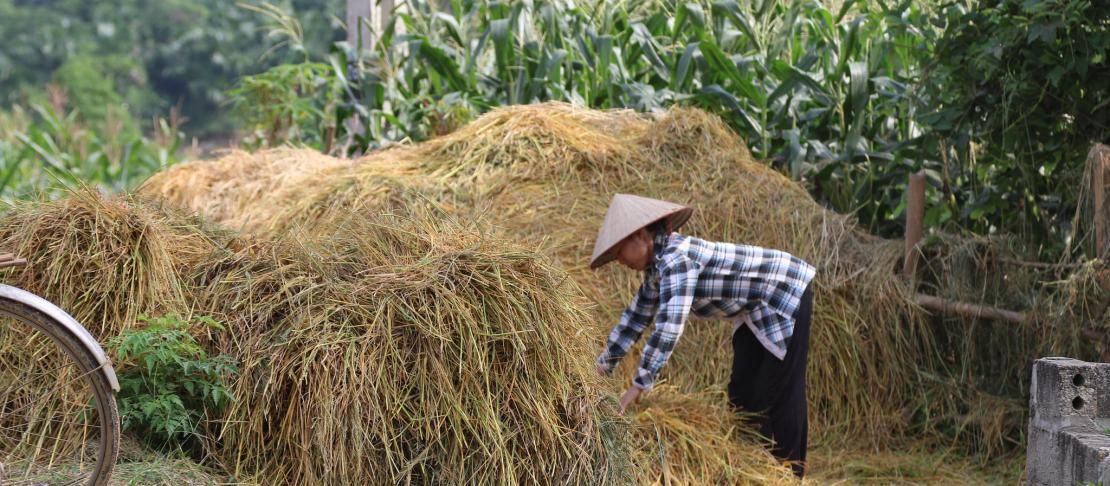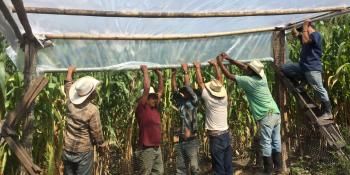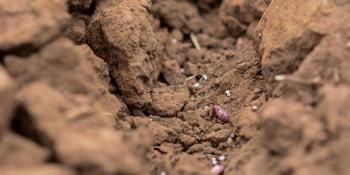CCAFS supports Vietnam in achieving agricultural mitigation targets

The Vietnamese Ministry of Agriculture and Rural Development (MARD), with support from the CGIAR Research Program on Climate Change, Agriculture and Food Security (CCAFS) Southeast Asia and CGIAR centers operating in Vietnam, organized a consultation workshop in August 2020 to evaluate what mitigation and adaptation measures could be prioritized and how the private sector could be engaged to implement the country’s Nationally Determined Contributions (NDCs).
Priority areas in agriculture
Vietnam could increase its NDC targets through negative cost mitigation measures in the land-use sector. After reviewing policy documents and relevant studies, the participants have shortlisted 15 adaptation and 10 mitigation options, which they have written into concept notes categorized under four themes.
The rice theme, for example, consists of projects on rice-shrimp farming, alternate wetting and drying, and rice-straw mushroom cultivation, all of which aim to reduce emissions from and improving climate resilience of rice cultivation in the Mekong River Delta and Red River Delta. Meanwhile, projects under the non-rice theme aim to improve climate resilience in Central Vietnam via fruit cultivation and coffee intercropping.
Under the livestock and waste management theme, biogas digesters would be promoted, which would treat pig manure in 10 provinces and cities across the country. The theme of forest and agroforestry meanwhile focuses on enhancing carbon pools, protecting soil, and improving climate resilience. It would replace corn monoculture with agroforestry on sloping lands in the northwest region and provide decision support in the Central Highlands to manage forests sustainably.
Ways forward
In a follow-up meeting with Dr. Nguyen Do Anh Tuan, Director-General of MARD’s International Cooperation Department, representatives from CGIAR centers discussed the next steps to finalize the concept notes. The steps include reviewing current and upcoming MARD projects for their relevance to NDC implementation and exploring if reducing emissions in postharvest/processing and food waste is possible.
CGIAR representatives committed to finalize the concept notes and strengthen the coordination among its centers, MARD, and other stakeholders. They also proposed to develop an overall program covering the priority areas to better integrate and share resources.
These commitments are a response to Dr. Tuan’s challenge of transforming the concept notes into full-pledged projects and developing management methods and monitoring and evaluation systems applicable in the NDCs and other MARD activities. The NDCs have been updated recently, aiming for higher emission reduction targets.
The target with domestic resources is now 9% reduction by 2030, equivalent to 83.9 million tons of CO2 compared to business-as-usual scenarios. It could be raised further to 27%—equivalent to 250.8 million tons of CO2—through international support.
Read more:
- News Update: Why update emission factors for irrigated rice in Vietnam?
- Journal article: Analysing the challenges in implementing Vietnam’s Nationally-Determined Contribution (NDC) in the agriculture sector under the current legal, regulatory and policy environment
- Press Release: Vietnam can reduce emissions, save $2.3 billion by 2030 in agriculture, forestry and land use
The workshop was attended by the Institute of Policy and Strategy for Agriculture and Rural Development (IPSARD), Food and Agriculture Organization of the United Nations (FAO), and several CGIAR centers in Vietnam (such as CIAT, CIFOR, CIP, ICRAF, ILRI, and IRRI). The CGIAR Research Program on Climate Change, Agriculture and Food Security in Southeast Asia also joined, serving as the focal point and coordinating body among CGIAR centers in supporting Vietnam’s NDC implementation.
Eisen Bernardo is the Senior Regional Communication Specialist of CCAFS Southeast Asia.



